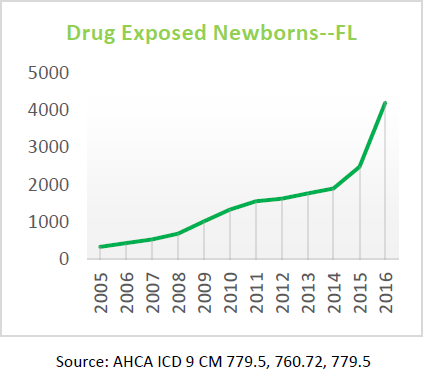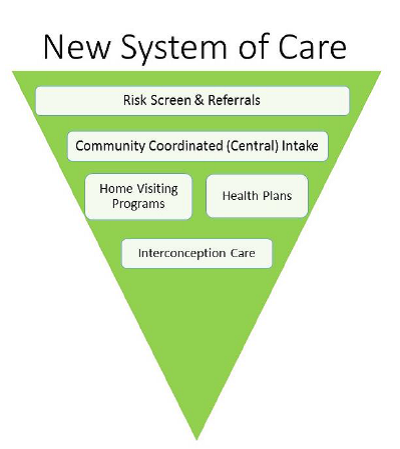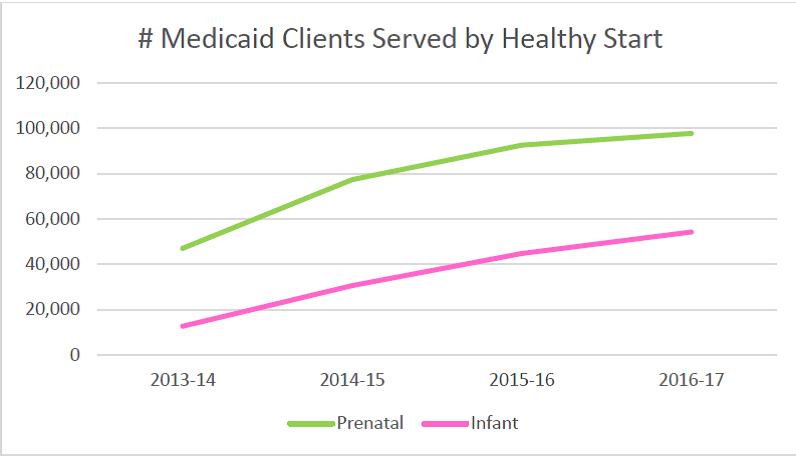The Florida Association of Healthy Start Coalitions (FAHSC) is seeking $12.8 million in additional state funding in FY 2018-19 to address the growing opioid epidemic and support the delivery of Healthy Start services to more at-risk pregnant women and newborns.
The organization, which represents 32 local coalitions working to reduce infant mortality and promote healthy child development, recently adopted the following Legislative Priorities:
- Enhanced Services for Drug Addicted Pregnant Women and Substance-Exposed Newborns
 Healthy Start proposes to strategically place new Family Engagement Specialist (FES) positions across the state of Florida to provide outreach, education, and service coordination for pregnant women addicted to drugs and families with a drug exposed newborn. This model is based on the successful project in Flagler and Volusia Counties. The FES will connect the mother with treatment resources, and coordinate services with the treatment center, home visiting programs, DCF, Early Steps and medical providers. The FES will work with the mother to create a Safe Plan of Care for the baby. Healthy Start is in a unique, strategic position to identify and engage mothers on drugs. Coalitions have the infrastructure in place to identify high-risk clients including the universal risk screen, referrals from medical providers, and self-referrals by clients. Coalitions also have experience with outreach/engagement of high-risk pregnant women and infants.
Healthy Start proposes to strategically place new Family Engagement Specialist (FES) positions across the state of Florida to provide outreach, education, and service coordination for pregnant women addicted to drugs and families with a drug exposed newborn. This model is based on the successful project in Flagler and Volusia Counties. The FES will connect the mother with treatment resources, and coordinate services with the treatment center, home visiting programs, DCF, Early Steps and medical providers. The FES will work with the mother to create a Safe Plan of Care for the baby. Healthy Start is in a unique, strategic position to identify and engage mothers on drugs. Coalitions have the infrastructure in place to identify high-risk clients including the universal risk screen, referrals from medical providers, and self-referrals by clients. Coalitions also have experience with outreach/engagement of high-risk pregnant women and infants.
- Newly Designed Healthy Start System of Care
Beginning July 2018, Healthy Start, at the direction of and in partnership with DOH and AHCA, will implement a newly designed Healthy Start model and system of care to achieve even greater impact on infant mortality, prematurity and healthy child development. The new system of care builds on 25 years of experience and offers proven, targeted services for mothers and babies, leveraging community resources, integrating costly evidence based interventions, and coordinating with Medicaid managed care plans. The changes include: the new coordinated intake and referral infrastructure; the new standardized, evidence based screening and interventions within our home visiting program; the new evidence based inter-conception care program; and enhanced coordination with the health plans. If no additional funding is received, services for families will need to be triaged by cutting services to 7,400 high risk women and babies (Reduction from an estimated 32,600 to 25,200 by serving Level 3 only in home visiting and Inter-Conception Care).
mortality, prematurity and healthy child development. The new system of care builds on 25 years of experience and offers proven, targeted services for mothers and babies, leveraging community resources, integrating costly evidence based interventions, and coordinating with Medicaid managed care plans. The changes include: the new coordinated intake and referral infrastructure; the new standardized, evidence based screening and interventions within our home visiting program; the new evidence based inter-conception care program; and enhanced coordination with the health plans. If no additional funding is received, services for families will need to be triaged by cutting services to 7,400 high risk women and babies (Reduction from an estimated 32,600 to 25,200 by serving Level 3 only in home visiting and Inter-Conception Care).
- Medicaid Funding Short-Fall
 Healthy Start Medicaid funding has not been sufficient to meet the needs for at-risk pregnant women and babies each year since the beginning of MMA. We have a 3 year total of more than $7 million in unpaid services provided by the Healthy Start Coalitions. The number of Medicaid-eligible pregnant women and infants served by Healthy Start has increased from 59,692 to 151,979 over the last 4 years with no increase in funding. Without the additional funding, approximately 5,500 pregnant women and infants will not receive services.
Healthy Start Medicaid funding has not been sufficient to meet the needs for at-risk pregnant women and babies each year since the beginning of MMA. We have a 3 year total of more than $7 million in unpaid services provided by the Healthy Start Coalitions. The number of Medicaid-eligible pregnant women and infants served by Healthy Start has increased from 59,692 to 151,979 over the last 4 years with no increase in funding. Without the additional funding, approximately 5,500 pregnant women and infants will not receive services.
Requested funding includes both state General Revenue and Medicaid. The Florida Legislative session, which will include adoption of a state budget for FY 2018-19, starts January 9, 2018. For more information contact James J. Bracher, FAHSC Executive Director.
